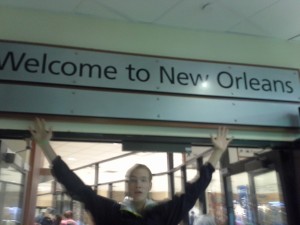Archive for year: 2015
First Impressions
/in NOLA /by Sean AndersonAlthough we have yet to enter the city of New Orleans itself, our brief tour from the airport to the hotel to dinner revealed a few aspects of the landscape. First, this place is flat! For someone who is accustomed to life in the foothills of the San Gabriel and Santa Monica mountains, the skyline is almost eerily void of topography. Second, at a glance one notices that much of the infrastructure is built to move water and prevent flooding. Third, the architecture is grand in some places, quaint in others. I am excited to explore more of the area this week, and get out to the swamp!
Culture of New Orleans
/in NOLA /by Sean AndersonNew Orleans has an interesting cultural background.

Dinner first night
/in NOLA /by Sean AndersonTonight we had an amazing dinner at Little G’s Kajun restaurant. Food was fantastic and bonding has begun…

Exploring the island by land and sea
/in Uncategorized /by Sean AndersonWe have been regularly running transects for the mpa study, and have had less problems since we’ve upgraded our ROVs to the 2.7 models.
We took some of out new members on a hike around Santa Rosa Island, and showed off some of the interesting relics that were left behind by the ranchers that settled on the islands.
We have had a lot of issues with our navigation a modules, so we have resorted to using a manual compass within the view of the camera, and, and relying on our gopro footage for fish counts.
RUBRICS
/in Uncategorized /by Julia BalenClose to Home
/in nursing420 /by Alissa PangWho knows about drugs?? Take an informal survey of family members, friends, or coworkers. Do they know the medications they take? If they don’t take medications, do they know about over the counter medications – drug/pharmacological/generic/brand names? Do they know the side effects and safe doses? What about homeopathic remedies and herbal medications? Let’s do some “close to home” education and see what happens! In class we can decide if you want to blog, voicethread, or just talk about what you found out…
Mom takes:
Glipizide (used to take Metformin) – “for my diabetes”
Simvastatin – “to control my cholesterol”
Amlodipine – “to manage my high blood pressure”
Cozaar (losartan) – “this is also for my high blood pressure”
My mom did a good job of telling me both the trade and generic names of her medications. She knew what each one was for, and even knew the actions of glipizide. However, she did not know the side effects of all her drugs. She said she’s never experienced any side effects, so she didn’t bother to look them up.
Dad takes:
Norco – “for shoulder pain” (he broke his arm and it gives him pain every once in a while)
Tramadol – “also for shoulder pain”
My dad knows the trade/generic names of the pain medications he takes, their pharmacological actions, the side effects, and safe doses. (He’s a healthcare provider and knows what’s up!)
Following this activity, I realized that my family is much more in tune with their medications and their indication for use because of my dad’s career as a healthcare provider. I work as a med tech at a retirement community and often find that many of the residents don’t really know what they are taking. Of course, they are on medication management because of their inability to manage their medication scheduling, or can’t remember to take their medications at all–but I feel that anyone taking medications should know what they are taking, what they’re for, and what side effects are associated with their medications (in case that these side effects affect normal activity). I’ve also known friends who would take Tylenol throughout the day, not realizing there is a suggested “not to exceed” or maximum dose per day due to its deleterious effects on the liver.
During my study abroad trip to Ireland this past winter, we were asked to go through the Irish pharmacies/drugstores and see how they were different from ours back in the US. We all immediately noticed that medications that were normally over the counter (like Tylenol, or Advil) were behind the counter, and required patient education from a pharmacist. I thought this was both weird and interesting, but coming back and thinking about it I realize the importance of patient education–even for OTC drugs.
Medication Education
/in Uncategorized /by Ashley TegleyMy family is fairly well educated and able to search out the information they need when self-administering. However, there are still typically gaps in knowledge due to a lack of understanding of foundational aspects of pharmacology and pathophysiology. I have one family member who is on many medications, and she is actually highly motivated to educate herself; she knows most of her medications fairly well. However, there are certain aspects of which she is not aware and so I’m careful to ask her questions pretty regularly about which medications and doses she is taking currently. Some months ago, her physician changed some of her meds and forgot to add a potassium sparing diuretic to her medication regimen, which includes Lasix and Digoxin…and her labs that week indicated K+ of 3.4. Since she was not aware of the implications regarding potassium, I had the opportunity to educate her on signs of hypokalemia and Digoxin toxicity, and on the need to supplement her diet with potassium until her physician came back from vacation and could correct her medication regimen.
In terms of homeopathic and “natural/herbal” medications, I find that even my friends/family who are knowledgeable about the broad spectrum of supplements do not base their beliefs on evidence, but simply what is reported by respected individuals or magazines; there is a strong media influence on adoption of these supplements into a person’s lifestyle. They are especially not aware of the act that these natural supplements can interact with most medications, the most serious of which include the anticoagulants and anticonvulsants. I have also found that this is the most difficult education in terms of meeting resistance. Some of my family members will keep using homeopathic medications despite my explanations.
In conclusion, in addition to educating our patients in the facility, there is a need for us to ensure that those closest to us are practicing caution with the medications needed for their health. I am grateful for the opportunity to be a resource to my family and friends in this way; even if I do not know the answer, I know where to find a good source that can offer an explanation.







